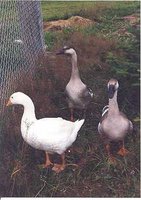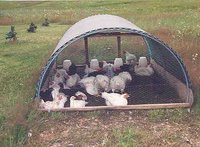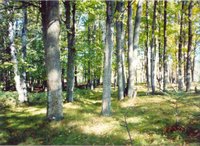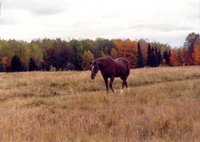Looking Ahead

As I sit here looking out across the barn yard we are getting a fresh blanket of snow. It’s been coming down on and off since last night. It’s beautiful and still outside with the snow hanging on every limb and branch. Someone once said “winter in the North Woods is like living in a post card”. I couldn’t agree with them more, especially on a day like this.
This is a great time of year for reflection. To look back at what we’ve done in the past, dream of the future and what we are going to do next season. Kelli and I have simplified our lives down to the bare minimum here at the farm and it is time to regroup and get serious about what goals to set next.
We’ve had tons of experience raising all kinds of animals over these past years. Goats, sheep, pigs, steer, rabbits, ducks, geese, chickens, guineas fowl and horses have all passed through our gates. Not to mention the usual household pets dogs and
 cats. We each have our own dog, 5 in all, 4 in the house and 1 outside. The one outside is mine a beautiful Siberian Husky named Apollo. The cats are all outside too. Never been into cats walking on the counters and such, so outside they stay. You might wonder how we came to have all these critters what with the limited income we’ve had since moving to northern Wisconsin.
cats. We each have our own dog, 5 in all, 4 in the house and 1 outside. The one outside is mine a beautiful Siberian Husky named Apollo. The cats are all outside too. Never been into cats walking on the counters and such, so outside they stay. You might wonder how we came to have all these critters what with the limited income we’ve had since moving to northern Wisconsin.Really if you have the space, it isn’t that hard to find animals. For one thing
 there are plenty of folks who for one reason or another can’t or don’t want to keep them any more and are more than glad to give them to someone who will take good care of them. Also in our region there are several animal swaps which we quite enjoy. Folks from all walks of life come to trade, barter, or sell their country products and critters of every type. We have met lots of neat and interesting folks at animal swaps. One word of caution though. Obtaining anything from an animal swap can be a risky proposition as you can quite easily get stuck with someone else’s cast offs. Sometimes people are just there, getting rid of.
there are plenty of folks who for one reason or another can’t or don’t want to keep them any more and are more than glad to give them to someone who will take good care of them. Also in our region there are several animal swaps which we quite enjoy. Folks from all walks of life come to trade, barter, or sell their country products and critters of every type. We have met lots of neat and interesting folks at animal swaps. One word of caution though. Obtaining anything from an animal swap can be a risky proposition as you can quite easily get stuck with someone else’s cast offs. Sometimes people are just there, getting rid of.We once obtained a milk goat that way and after having it awhile you could see there where things about the creature that made you realize why they got rid of her in the first place. First of all she must of had some kind of birth defect because she had a hard time going full term with kidding and gave birth prematurely. She did work out alright as a milker, however. She was very tame, a real sweet heart really, but twice a day about a half an hour before milking time she would start this horrible bellering. I mean she sounded like someone was being murdered. We don’t have neighbors right on our door step but, they where plenty close enough to hear that terrible wailing. It’d carry a half mile easily. If we were out in the woods and it was getting even close to time to milk her she’d let us know. And if we didn’t come running she’d get louder and louder. Pretty soon people would swear someone just got their arm caught in a ringer. Didn’t take much imagination to know why she got taken to the swap.
That’s how we managed to acquire so many animals over the years. Mostly we got every bodies cast offs. You can get them real cheap or even free that way. But, I wouldn’t
 recommend it if you don’t have to. Everything I have ever read through my life regarding raising any kind of animal is to get the best stock you can possibly afford. Now, there are charlatans who will rip you off every time. I don’t mean to suggest paying too much either. However good quality foundation stock from a reputable breeder is usually going to cost a little bit. The highest quality animals should fetch the highest prices. I have heard of good natured folks giving people who are just getting into it a break and not charging top price, just out of the joy of seeing someone get started. But, that is more the exception than the rule.
recommend it if you don’t have to. Everything I have ever read through my life regarding raising any kind of animal is to get the best stock you can possibly afford. Now, there are charlatans who will rip you off every time. I don’t mean to suggest paying too much either. However good quality foundation stock from a reputable breeder is usually going to cost a little bit. The highest quality animals should fetch the highest prices. I have heard of good natured folks giving people who are just getting into it a break and not charging top price, just out of the joy of seeing someone get started. But, that is more the exception than the rule.Then again if you aren’t going into breeding and if you just want to raise something for meat no sense paying a high price if you don’t have to. One time we got some runt pigs that way. We went to a well known pig farmer who always had babies in
 the spring. By the time we contacted him he was completely sold out of piglets but he did have a couple runts he’d let go for half what he usually charged. We bought them and they were fine. They didn’t get near as big as the usual pig when they where at butchering age but, it didn’t matter to us. They were healthy and sound otherwise. Tasted great. There is no comparing home raised meat with what you get in the supermarkets. Home raised is superior in every way. No contest.
the spring. By the time we contacted him he was completely sold out of piglets but he did have a couple runts he’d let go for half what he usually charged. We bought them and they were fine. They didn’t get near as big as the usual pig when they where at butchering age but, it didn’t matter to us. They were healthy and sound otherwise. Tasted great. There is no comparing home raised meat with what you get in the supermarkets. Home raised is superior in every way. No contest.Right now as I’ve mentioned previously, over the past year or so we have down scaled and are down to just raising poultry. They have worked well for us and pretty much pay their way. The next phase is to start experimenting with growing our own feed for the birds. Earlier I read Northern Farmers January 27th post about this very subject and am encouraged that we can indeed become independent from store bought feed.
 Currently we have gotten our egg layers off of the commercial laying mash and are using an old time mix that a good friend recently learned about. I’m embarrassed to admit that right now I don’t even know what’s in it. We just tell the feed store to give us Christine’s mix. The hens are laying well on it and are looking good and healthy too. As soon as I find out the recipe I’ll be sure to include it in a future post. One thing I know for sure is that it does not have soy bean. But the ultimate goal is to start growing it ourselves. Harvesting grain is something we know very little about so we have some learning ahead of us.
Currently we have gotten our egg layers off of the commercial laying mash and are using an old time mix that a good friend recently learned about. I’m embarrassed to admit that right now I don’t even know what’s in it. We just tell the feed store to give us Christine’s mix. The hens are laying well on it and are looking good and healthy too. As soon as I find out the recipe I’ll be sure to include it in a future post. One thing I know for sure is that it does not have soy bean. But the ultimate goal is to start growing it ourselves. Harvesting grain is something we know very little about so we have some learning ahead of us.The next animal venture we get into we want to do it right. It is going to have to be self supporting if we are going to do it at all. Like our friend Christine, wants to get into raising meat goats. We have talked in the past about going in on it
 with her. We have the space and if we teamed up together to harvest our own feed right here then it might work out. Finding a market is also another big consideration.
with her. We have the space and if we teamed up together to harvest our own feed right here then it might work out. Finding a market is also another big consideration.Well, I guess I’d better wind this down if I’m going to get it posted today. I have some pictures that I want to include and with this dial up connection it takes what seems like forever. Our kids are house sitting for some friends and we are going to take a chicken dinner down and eat with them.
Oh, by the way, we just got the last of last falls broilers butchered up this past Friday. Boy were they some hefty buggers.
Until Next Time






